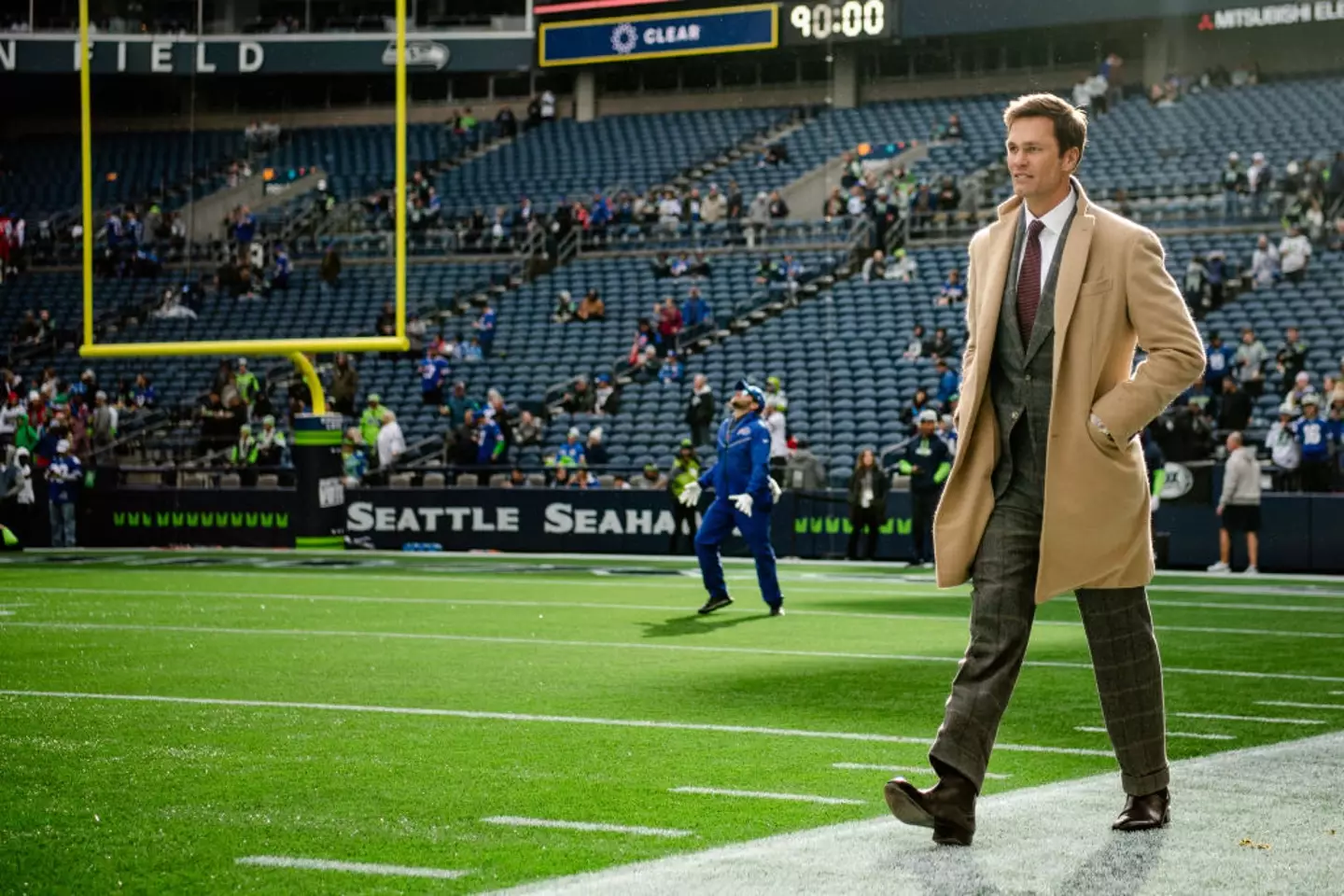Tom Brady, celebrated as one of the NFL’s all-time greatest quarterbacks, has stirred controversy online after using an offensive term on live television to describe an NFL player. Known for his seven Super Bowl wins and five MVP titles, Brady’s transition from star quarterback to Fox Sports commentator hasn’t been as seamless as expected. Let’s delve into the details of the incident, why it caused outrage, and the broader implications in the media world.

Tom Brady’s Transition to Broadcasting
Brady, 47, signed a record-breaking 10-year, $375 million deal with Fox Sports to become a color commentator alongside Kevin Burkhardt. With his esteemed reputation on the field, expectations were high for Brady to bring his expertise and charisma to the commentator’s booth. However, fans initially found his commentary style lacking, and his latest controversy could potentially undermine his hard-earned legacy.
The Incident That Sparked Outrage
The incident in question took place during the Buffalo Bills vs. Seattle Seahawks game. While discussing the performance of Bills quarterback Josh Allen, Brady commented:
“Sometimes he played like a sp*z, like a grade-schooler on a sugar high, but now he’s controlled the chaos. He’s like a storm coming into town and you don’t want that storm coming into this town.”
Understanding the Term “Sp*z” and Its Controversial History
The term Brady used is a shortened form of “spastic,” which originates from the medical term “spasticity,” describing involuntary muscle contractions often linked to neurological conditions. In casual language, it became a derogatory term implying clumsiness or excessive excitability, but its negative connotation as an insult to people with disabilities has made it socially unacceptable. In recent years, public figures who have used the term have faced backlash, and advocates have highlighted the importance of avoiding language that can unintentionally stigmatize or hurt communities.
Public Reaction on Social Media
Viewers were quick to react online, taking to social media to express their disapproval of Brady’s choice of words. Comments flooded in, including one user who posted, “Did you hear Tom Brady call Josh Allen a ‘sp*z’ in the first half of today’s Bills game? Highly offensive to people who have physical disabilities as well as their loved ones.” Another added, “Someone’s gotta tell him he can’t say that on TV.”
The backlash mirrors past incidents involving prominent figures like Beyoncé and Lizzo, who both used the term in songs only to later edit their lyrics after facing similar criticism.

The NFL legend used a term seen as offensive by many shocked viewers (Jane Gershovich/Getty Images)
A History of Public Figures Facing Backlash for Language Choices
This isn’t the first time a high-profile personality has been criticized for using potentially offensive language on a public platform. Beyoncé and Lizzo faced backlash for using the term in their songs “Heated” and “Grrrls,” respectively. Following public outcry, both artists took immediate action to re-record and release edited versions of their songs. This swift response set a precedent in the entertainment industry for accountability and sensitivity toward communities affected by derogatory language.
Impact on Tom Brady’s Broadcasting Career
Given that Brady’s post-NFL career hinges on his reputation, this controversy could have significant repercussions. His $375 million contract with Fox Sports came with high expectations, and this misstep could jeopardize the trust viewers place in his broadcast persona. As Brady continues to navigate his new role, he will need to strike a delicate balance between his personality and the professionalism expected of a broadcaster.

While sports commentary often includes colorful language, using terms that offend marginalized groups can quickly become a liability. This incident may push Fox Sports to consider implementing more rigorous sensitivity training for their on-air talent, reinforcing the importance of respectful language, especially in live broadcasts.
The Role of Media Personalities in Setting Language Standards
In an age where media personalities reach millions within seconds, their words hold great weight. They often set informal standards for acceptable language in public discourse, making it crucial for them to stay informed on the evolution of language and cultural sensitivities. Commentators like Brady, who are new to broadcasting, face a learning curve as they adapt to the nuances of live television, where even a slip-up can spark significant backlash.
The incident also serves as a reminder of the evolving nature of language. What may once have been casual slang can now hold offensive connotations, especially as society grows more conscious of inclusivity. For broadcasters, especially those transitioning from other careers, understanding these nuances is key to maintaining credibility and audience trust.
Tom Brady’s Response and Future Implications
While Brady has not yet issued a formal apology, addressing the controversy may help him regain public trust. Apologizing for the unintended offense and acknowledging the term’s hurtful connotations could show accountability, something viewers increasingly expect from public figures. Given that past incidents involving celebrities have often included public apologies and amendments, an apology could help Brady set a respectful example for other broadcasters and reaffirm his commitment to the role.

Lessons for Broadcasters and Public Figures
This incident underscores the importance of understanding the evolving language standards in media. For Brady and other commentators, it’s essential to be mindful of the language used, particularly when reaching diverse and global audiences. Here are key takeaways:
- Sensitivity Training: Many media outlets have started to implement language and sensitivity training to prevent on-air mistakes that could offend viewers.
- Adaptability: As society’s views on language change, commentators must remain flexible and informed on words that may carry negative or offensive meanings.
- Responsibility: Public figures, especially those in live broadcasting, should acknowledge their influence and the importance of respectful language. Simple word choices can have a profound impact, and taking accountability for mistakes is essential to maintaining credibility.
Conclusion
Tom Brady’s slip-up serves as a reminder that language is powerful and should be chosen with care. In his new career as a broadcaster, Brady faces unique challenges, and while his success on the field earned him admiration, this incident highlights the responsibility that comes with being in the public eye in a different way. Learning from this experience, Brady has the opportunity to approach his broadcasting career with a renewed understanding of sensitivity, setting a respectful example for others in the industry.
As public figures transition into media roles, understanding and respecting the impact of language on diverse audiences will be essential for long-term success.